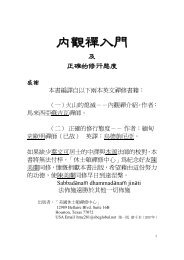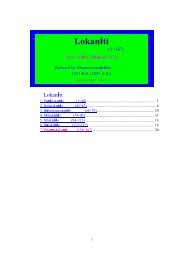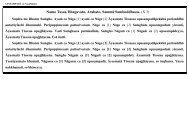Pamuyhati (pa+ muh( 梵 muh) 昏 迷 +ya) 迷 惑 、 著 迷 (is bewildered or infatuate)。 【 過 】pamuyhi。【 獨 】pamuyhitvā,pamuyha。Pamussati (pa+mus +ya) 忘 記 。【 過 】pamussi。【 過 分 】pamuṭṭha。【 獨 】pamussitvā。Pamūḷha (pamuyhati 的 【 過 分 】) , 已 迷 惑 。Pameyya,【 形 】 可 量 的 , 可 限 制 的 , 可 測 的 。Pamokkha,【 陽 】 釋 放 (release), 解 脫 (deliverance), 解 放 (letting loose, discharge)。Pamocana,【 中 】 釋 放 , 放 鬆 , 救 出 。Pamoceti (pa+muc 釋 放 +e) 釋 放 , 解 脫 。【 過 】pamocesi。【 過 分 】pamocita。【 獨 】pamocetvā。Pamoda,【 陽 】 高 興 , 歡 喜 。Pamodati (pa+mud+a) 歡 喜 , 享 受 , 很 高 興 。【 過 】pamodi。【 過 分 】pamodita。【 現 分 】pamodamāna。【 獨 】pamoditvā。Pamodanā,【 陰 】 參 考 Pamoda。Pamohana,【 中 】 騙 局 , 錯 覺 (deception; delusion)。Pamoheti (pa+ muh( 梵 muh) 昏 迷 +e) 欺 騙 、 使 迷 惑 、 使 著 迷 (deceives; bewilders; fascinates)。【 過 】pamohesi。【 過分 】pamohita。【 獨 】pamohetvā。Pampaka,【 陽 】 懶 猴 (a loris)。Pamha,【 中 】 睫 毛 (the eye-lash)。Paya,【 陽 、 中 】(mano 組 ), 牛 奶 , 水 。Payacchati (pa+yacchati of yam), 提 供 , 呈 (to offer, present, give)。Payata (pp. of payacchati), 【 無 】 抑 制 的 , 淨 化 的 (restrained, composed, purified, pure)。payatapāṇi, 張 開 掌 ( 施 )(withoutstretched hand, open-handed, liberal )。Payatana,【 中 】 努 力 。Payāti (pa+yā +a), 向 前 去 , 出 發 , 著 手 進 行 , 潑 ( 水 )。【 過 】payāsi。【 過 分 】payāta。Payirupāsati (pari+upa+ās+a), 侍 候 (attends on), 交 往 (associates), 尊 敬 (honours)。【 過 】payirupāsi。【 過 分 】payirupāsita。【 獨 】payirupāsitvā。payirupāseyya,【 未 被 】 應 被 交 往 。Payirupāsanā,【 陰 】 侍 候 , 結 交 。Payuñjati (pa+yuj +ṁ-a), 束 以 馬 具 (harnesses), 雇 用 , 應 用 。【 過 】payuñji。【 過 分 】payutta。【 現 分 】payuñjamāna。【 獨 】payuñjitvā。Payuttaka,【 形 】 受 任 命 一 件 工 作 的 人 , 間 諜 。Payoga,【 陽 】1. 方 法 (means)、 工 具 (instrument, =karaṇa)。2. 準 備 , 從 事 , 事 業 , 練 習 (preparation, undertaking,occupation, exercise)。payogakaraṇa,【 中 】 努 力 , 追 求 。payogavipatti,【 陰 】 方 法 的 失 敗 , 錯 誤 的 應 用 。payogasampatti,【 陰 】 方 法 的 成 功 。Payojaka, payojetu,【 陽 】 指 示 者 , 處 理 者 , 經 理 。Payojana (
1.(adv.& prep.) beyond, on the further side of (with Abl.or Loc.), over(para Gangāya, v.l.°āyaŋ).-- 2.(adj.) para followsthe pron.declension; cases:sg.Nom.paro, Acc.paraŋ, Gen.Dat.parassa, Instr.parena, Loc.paramhi Sn 634, and pare;pl.Nom.pare, Acc.pare, Gen.Dat.paresaṁ, Instr.parehi.-- Meanings:(a) beyond, i.e."higher" in space (like Ved.paraas opp. to avara lower), as well as "further" in time (i.e.future, to come, or also remote, past:see Loc.pare under c.),freq.in phrase paro loko the world beyond, the world (i.e.life) to come, the beyond or future life (opp. ayaŋ loko)(asmā lokā paraŋ lokaŋ na socati), (asmiŋ loke paramhi ca); (paramhi loke); (id.=paraloke); but also in other comb n ,like santi-para (adj.) higher than calm.Cp.paraloka, paraŋ and paro.-- (b) another, other, adj.as well as n.,pl.others(parassa dāraŋ nâtikkameyya), (paresaṁ, cp.Nd 1 150); (ko paro who else), (pare others); (parassa dānaṁ);II.9 43 (pare, Loc.= paramhi parassa);(Gen.pl.); (paresaṁ Dat.) (parassa purisassa & paraŋ purisaŋ).Often contrastedwith and opposed to attano (one’s own, oneself), (paraṁ vambheti attānaŋ ukkaŋseti);(attānaṁ samukkaṁse paraṁavajānāti); (paresaṁ, opp. attanā); (att-attha opp. par-attha, see cpds.°ajjhāsaya & °attha).-- paro ...paro "theone ...the other" (kiŋ hi paro parassa karissati); paro paraŋ one another (paro paraŋ nikubbetha). In a special sense wefind pare pl.in the meaning of "the others," i.e.outsiders, aliens (to the religion of the Buddha), enemies, opponents(like Vedic pare) (=paṭiviruddhā sattā).-- (c) some oblique cases in special meaning and used as adv.:paraṁAcc.sg.m.see under cpds., like parantapa; as nt.adv.see sep.In phrase puna ca paraŋ would be better read punac’aparaŋ (see apara).--parena (Instr.) later on, afterwards (=aparena samayena C.).--pare (Loc.); in the past, before,yet earlier (where it continues ajja and hiyyo, i.e.to-day and yesterday, and refers to the day beforeyesterday.Similarly at Vin IV.63 pare is contrasted with ajja & hiyyo and may mean "in future," or "the day beforeyesterday." It is of interest to notice the Ved.use of pare as "in the future" opp. to adya & śvas); (the day beforeyesterday).(sve vā pare vā) and in the sense of "on the day after tomorrow." --parā (only apparently Abl., in realityeither para+a° which represents the vocalic beginning of the second part of the cpd., or para+ā which is thedirectional prefix ā, emphasizing para.The latter expl n is more in the spirit of the <strong>Pali</strong> language):see separately.--paro(old Abl.as adv.=Sk.paras) beyond further:see sep.--parato (Abl.) in a variety of expressions and shades of meaning,viz.(1) from another, as regards others(attano parato ca).-- (2) from the point of view of "otherness," i.e.as strange orsomething alien, as an enemy (in "anicca"--passage);Miln.418 and passim; in phrase parato disvā "seen as notmyself"(saṅkhāre parato passa, dukkhato mā ca attato).(3) on the other side of, away from, beyond(kuḍḍānaŋ).-- (4)further, afterwards, later on.-- Note.The compounds with para° are combinations either with para 1 (adv.prep.), orpara 2 (adj.n.).Those containing para in form parā and in meaning "further on to" see separately under parā°.See alsopāra, pārima etc.--ajjhāsaya intent on others (opp. att°).--attha (parattha, to be distinguished from adv.parattha, q.v.sep.) the profit orwelfare of another (opp. attattha).--âdhīna dependent on others(=paresu adhīno parass’eva ruciyā pavattati);(°vuttika); (°vutti, paresaṁ bhāraŋ vahanto).--ûpakkama aggression of an enemy, violence.--ûpaghāta injuringothers, cruelty.--ûpaghātin killing others(=paraŋ upahananto).--ûpavāda reproaching others.--kata see paraṅkata.--kamma service of others, °kārin serving others.--kāra see below under paraṅkāra.--kula clan of another,strange or alien clan.--kkanta [para° or parā° *krānta?] walked (by another? or gone over?).--kkama (parā+kram)exertion, endeavour, effort, strife (daḷha°); (purisa°); (purisa°);; adj.(-°) sacca° one who strives after thetruth.--kkamati [*parakramati] to advance, go forward, exert oneself, undertake, show courage(ger.parakkamma);(imper. parakkāma, v.l.parakkama)(=payogaŋ karoti).--kkaroti [either for parā+kṛ or more likelyparas+kṛ, cp.paro] lit."to put on the opposite side," i.e.to remove, do away with(corresponding to apaneti, C.expl ns as"parato kāreti," taking parato in the sense of para 2 c 3), (mā parākari=mā pariccaji C.).--gatta alien body, trsl."limbsthat are not thou".--gavacaṇḍa violent against the cows of another (opp. sakagavacaṇḍa, cp.PugA 226:yo attanogogaṇaŋ ghaṭṭeti, paragogaṇe pana so rato sukhasīlo hoti etc.).--(n)kata made by something or somebody else,extra-self, extraneous, alien(nayidaŋ attakataŋ bimbaŋ nayidaŋ parakataŋ aghaŋ); with ref.to loka & dukkha andopposed to sayaṅkata.--(n)kāra condition of otherness, other people, alienity(opp. ahaṅkara 自 我 selfhood).--cittathe mind or heart of others.--jana a stranger, enemy, demon, fig.devil (cp.Sk.itarajana) --tthaddha [parā+tthaddha]propped against, founded on, relying on (with Loc.) (=upatthadda C.).--tthabbha is to be read for °tthambha at, inmeaning=°tthaddha (kismiŋ).--dattûpajīvin living on what is given by others, dependent on another’s gift.--davuttasee sep.under parada --dāra the wife of another, somebody else’s wife (°sevanā) (°upasevin, cp.DhA III.482);303
- Page 1:
巴 漢 詞 典 2009.5.( 增 訂
- Page 4 and 5:
tadupayuttaparidīpanattho. Karaṇ
- Page 6 and 7:
序在 漢 語 界 的 南 傳 佛
- Page 8 and 9:
寫 這 部 辭 典 時 曾 參 考
- Page 12 and 13:
akkamana(cp. BSk. ākramaṇa), 【
- Page 14 and 15:
wanderer (mendicant))。rājāgāra
- Page 16 and 17:
指 智 之 女 , 不 能 到 彼
- Page 18 and 19:
ajānanta, ajānamāna,【 現 分
- Page 20 and 21:
añch,【 字 根 I.】 拉 出 (to
- Page 22 and 23:
aṭṭhapada,【 中 】 棋 盤
- Page 24 and 25:
髖 骨 )、 骶 骨 ( 薦 骨 、
- Page 26 and 27:
atighora,【 形 】 可 怕 的 ,
- Page 28 and 29:
Ato,【 無 】 因 此 , 今 後
- Page 30 and 31:
Atthata (attharati 的 【 過 分
- Page 32 and 33:
未 來 時 (future time),paccuppan
- Page 34 and 35:
Adhimuccati (adhi 在 … 上 +muc(
- Page 36 and 37:
Anāmata (an + amata the ā being d
- Page 38 and 39:
Anārammaṇa,【 中 】 無 所
- Page 40 and 41:
nīharaṇavināsatthañhi idaṁ n
- Page 42 and 43:
羅 三 藐 三 菩 提 。Anuttān
- Page 44 and 45:
24 paññāpāsādo 25 paññā-āl
- Page 46:
Anuppadāti (anu 隨 +pa+dā 給 +a
- Page 49 and 50:
Anuvāsana,【 中 】 香 水 。A
- Page 51 and 52:
Anelagala, Aneḷagala, Aneḷaga
- Page 53 and 54:
Anvattha,【 形 】 依 照 感
- Page 55 and 56:
Apalāyī,【 形 】 不 逃 的 ,
- Page 57 and 58:
無 意 識 , 將 臥 在 地 上 ,
- Page 59 and 60:
( 即 多 給 少 拿 , 少 給 更
- Page 61 and 62:
方 式 。4. 接 納 樂 受 (sād
- Page 63 and 64:
多 經 》 卷 第 三 百 八 十
- Page 65 and 66:
【 過 分 】。abhinikkhamma,【
- Page 67 and 68:
Abhirucira,【 形 】 多 令 人
- Page 69 and 70:
Abhisiñcati (abhi 全 面 +siñcat
- Page 71 and 72:
amogha,【 形 】 非 空 的 ,
- Page 73 and 74:
Araha, Araha-(Vedic arha of arh),
- Page 75 and 76:
Alaṁ,【 無 】 夠 了 ! 做
- Page 77 and 78:
Avatiṭṭhati( 梵 avatiṣṭhas
- Page 79 and 80:
sīlasampannassa na cetanāya kara
- Page 81 and 82:
Asaṁsaṭṭha(a+saṁsaṭṭha)
- Page 83 and 84:
A.1.2./I,4...“Nāhaṁ, bhikkhave
- Page 85 and 86:
折 磨 。)。單複主 ahaṁ may
- Page 87 and 88:
Ākāra(ā + karoti, kar),【 陽
- Page 89 and 90:
parisuddho ājīvo, 清 淨 活 命
- Page 91 and 92:
Āditya,【 梵 】 日 , 日 天
- Page 93 and 94:
*Āpā & *Āvā (for āpadā, q. v.
- Page 95 and 96:
Āmodamāna,【 現 分 】 高 興
- Page 97 and 98:
全 然 的 精 進 , 已 慇 懃
- Page 99 and 100:
Ālimpana,【 中 】1. 塗 。2.
- Page 101 and 102:
Āvi(Sk. āviḥ),【 無 】 公
- Page 103 and 104:
strike; fig. to offend, assail, ins
- Page 105 and 106:
II 巴 利 文 字 母 表 的 羅
- Page 107 and 108:
Itthatta,【 中 】1.(itthaṁ+tta
- Page 109 and 110:
受 彼 等 古 秘 典 之 聖 句
- Page 111 and 112:
UU 巴 利 文 字 母 表 的 羅
- Page 113 and 114:
Uggahetu,【 陽 】 學 徒 , 著
- Page 115 and 116:
Ujjhāpeti (u 出 +jhe +āpe), 激
- Page 117 and 118:
Uda,【 無 】 或 , 和 。Udaka,
- Page 119 and 120:
界 欲 )、 對 無 色 界 生
- Page 121 and 122:
kammantā vipajjanti, 6 kule vā ku
- Page 123 and 124:
Upadhāna,【 中 】 枕 頭 ,【
- Page 125 and 126:
Upalakkhita, (Upalakketi 的 【
- Page 127 and 128:
Upahanati (upa 近 +han+a), 傷 害
- Page 129 and 130:
Visakhuposatha Sutta〈VIII,43〉,
- Page 131 and 132:
DhsA 45.Uppādana(< uppada 2 ),【
- Page 133 and 134:
隨 著 他 。Ullaṅghana,【 中
- Page 135 and 136:
ŪŪ 巴 利 文 字 母 表 的
- Page 137 and 138:
(appanā-upacārasamādhi)。SṬ.4
- Page 139 and 140:
Ena, 他 , 這 ( 一 些 情 形
- Page 141 and 142:
OO, 巴 利 文 字 母 表 的 羅
- Page 144:
Odakantika,【 中 】 水 的 附
- Page 147 and 148:
Ovāda,【 陽 】 忠 告 , 教
- Page 149 and 150:
KK, 巴 利 文 字 母 表 的 羅
- Page 151 and 152:
Kaṭuviya,【 形 】 吐 出 的
- Page 153 and 154:
Katamatte,【 處 】 一 旦 做
- Page 155 and 156:
Kadalī 1 (Sk. kadalī),【 陰 】
- Page 157 and 158:
Kamalinī,【 陰 】 蓮 池 。Ka
- Page 159 and 160:
dukkhakkhandho kāmahetu kāmanidā
- Page 161 and 162:
producing)。【 陰 】Karaṇī
- Page 163 and 164:
Kalusa,【 中 】1. 犯 。2. 不
- Page 165 and 166:
āmarāga,【 陽 】 激 情 。k
- Page 167 and 168:
kālanti samaye samaye)。kālaṁ
- Page 169 and 170:
Kiñca (kiṁ 什 麽 ?+ca 和 ),
- Page 171 and 172:
Kukutthaka,【 陽 】 雉 ( 一
- Page 173 and 174:
Kuppati (kup 使 激 動 +ya), 生
- Page 175 and 176:
Kuhanā,【 陰 】 欺 騙 , 僞
- Page 177 and 178:
Koṭṭha 2 , 可 能 是 : 啄
- Page 179 and 180:
KhKh, 巴 利 文 字 母 表 的
- Page 181 and 182:
caus. khamāpeti。dukkhamati, 難
- Page 183 and 184:
khīṇāsava,【 形 】 漏 盡
- Page 185 and 186:
cackling, cawing, in haṁsagaggara
- Page 187 and 188:
ganth( 梵 grath/ granth),【 字
- Page 189 and 190:
Gahaṇī,【 陰 】 妊 娠 , 懷
- Page 191 and 192:
gilā,【 字 根 III.】 不 舒
- Page 193 and 194:
境 色 , 是 五 根 所 緣 之
- Page 195 and 196:
GhGh, 巴 利 文 字 母 表 的
- Page 197 and 198:
ṄṄ, 巴 利 文 字 母 表 的
- Page 199 and 200:
【 形 】 四 倍 的 , 四 重
- Page 201 and 202:
Carima, carimaka,【 形 】 最
- Page 203 and 204:
Citi,【 陰 】 堆 , 石 堆 紀
- Page 205 and 206:
hikkhave, maraṇaṁ.( 復 次 ,
- Page 207 and 208:
chCh, 巴 利 文 字 母 表 的
- Page 209 and 210:
洞 口 。Chiddita,【 形 】 穿
- Page 211 and 212:
Janatā (from janati), 【 陰 】
- Page 213 and 214:
下 方 壓 下 去 最 痛 的 點
- Page 215 and 216:
Jālikā,【 陰 】 以 鏈 製
- Page 217 and 218:
“Anāthapiṇḍikassa ārāmo”
- Page 219 and 220:
jhe,【 字 根 I.】 靜 靜 思
- Page 221 and 222:
ṬṬ, 巴 利 文 字 母 表 的
- Page 223 and 224:
ḌḌ 巴 利 文 字 母 表 的
- Page 225 and 226:
Takketi (takk 尋 +e), 思 考 ,
- Page 227 and 228:
“Yathāvādī, bhikkhave, Tathāg
- Page 229 and 230:
色 頭 髮 的 。tambacūla,【
- Page 231 and 232:
Tāva(Sk. tāvat),【 無 】 這
- Page 233 and 234:
Tidhā,【 副 】 三 方 式 。T
- Page 235 and 236:
Tussati (tus 滿 意 +ya), 高 興
- Page 237 and 238:
與 格 Dat.、 tava、tavaṁ、tu
- Page 239 and 240:
Thira,【 形 】 牢 固 的 , 固
- Page 241 and 242:
DD, 巴 利 文 字 母 表 的 羅
- Page 243 and 244:
Dametu,【 形 】 馴 獸 師 ,
- Page 245 and 246:
Dātabba,【 義 】 可 以 給
- Page 247 and 248:
地 論 》 說 見 法 者 得 十
- Page 249 and 250:
苦 行 ( 指 六 年 之 苦 行 )
- Page 251 and 252:
Duttara,【 形 】 難 渡 的 ,
- Page 253 and 254:
1色 )、 觸 色 ( 地 、 火 、
- Page 255 and 256:
骨 (n. aṭṭhi)。9. 髓 (f. a
- Page 257 and 258:
Dhameti (dham 吹 +e), 吹 , 使
- Page 259 and 260: Dharā,【 陰 】 地 球 。Dhava
- Page 261 and 262: NN, 巴 利 文 字 母 表 的 羅
- Page 263 and 264: Namo & Nama (Ved.、 梵 namas),【
- Page 265 and 266: Pāci.IV,6...Nāmaṁ nāma dve nā
- Page 267 and 268: Nikkuha,【 形 】 不 騙 人 的
- Page 269 and 270: nijjhāyita。Nijjhāyati 2 (ni+jh
- Page 271 and 272: Nipajjati (ni+pad 去 +ya), 躺 下
- Page 273 and 274: vaṭṭadukkhato pārametīti 從
- Page 275 and 276: upaṭṭhāti.…(CS:p.149) Gatini
- Page 277 and 278: Niyojana,【 中 】 敦 促 , 命
- Page 279 and 280: Nivātaka(< nivāta 1 ),【 中 】
- Page 281 and 282: meanings)。1. near, near by, on, a
- Page 283 and 284: lohita odāta; in the description o
- Page 285 and 286: PP, 巴 利 文 字 母 表 的 羅
- Page 287 and 288: 分 】pacanta。【 義 】pacitab
- Page 289 and 290: Paccūsa,【 陽 】 早 晨 。pac
- Page 291 and 292: 伴 隨 欲 、 可 染 。 耳 所
- Page 293 and 294: Paṭikaṅkha (paṭi 相 反 + ka
- Page 295 and 296: kevalassa dukkhakkhandhassa samuday
- Page 297 and 298: Paṭibaddha, (paṭibandhati 的
- Page 299 and 300: Paṭivirati (
- Page 301 and 302: 【3. 複 . 過 】paccassosuṁ(
- Page 303 and 304: Paṇṇikā,【 陰 】 蔬 菜 ,
- Page 305 and 306: eads padako; ajjheti vedeti cā ti
- Page 307 and 308: Papa,【 中 】 水 。Papañca,
- Page 309: 至 今 , 得 自 , 來 自 。tato
- Page 313 and 314: Parāyatta,【 形 】 屬 於 他
- Page 315 and 316: 包 括 「 名 色 分 別 智 」
- Page 317 and 318: Paripūrati (pari+ pūr( 梵 pṛ /
- Page 319 and 320: Pariyāpuṇana,【 中 】 學 習
- Page 321 and 322: Parisujjhati (pari 遍 +sudh( 梵
- Page 323 and 324: Pali° (=pari°, 摩 揭 陀 語 ,
- Page 325 and 326: Pavuccati (pa+vac 說 +ya), 被 叫
- Page 327 and 328: 【 單 . 與 】【 單 . 屬 】p
- Page 329 and 330: 第 十 四 , 到 第 十 五 ( 日
- Page 331 and 332: Pātu-,【 字 首 】 出 現 。P
- Page 333 and 334: ārā.pg.34):Pārājiko hotīti sey
- Page 335 and 336: Pitika,【 形 】( 在 【 合 】
- Page 337 and 338: 【 形 】 心 的 喜 悅 , 使
- Page 339 and 340: Puṇṇamāsī, puṇṇamī,【
- Page 341 and 342: 1 具 五 緣 持 戒 清 淨 衣
- Page 343 and 344: Pekkhaka,【 形 】 正 在 看
- Page 345 and 346: PhPh, 巴 利 文 字 母 表 的
- Page 347 and 348: (with flowers) Sn.233 (°agga=supup
- Page 349 and 350: J.I,384.)。balipīḷita, (crushed
- Page 351 and 352: ahma-svara), 梵 音 (brahmassara),
- Page 353 and 354: 成 就 以 前 尚 未 成 就 的
- Page 355 and 356: desito paññatto so vo mamaccayena
- Page 357 and 358: Brāhmaṇa 2 (for brahmañña),
- Page 359 and 360: Bhaṇati (bhaṇ 告 訴 +a), 說
- Page 361 and 362:
物 而 令 住 者 ;(5) 水 得
- Page 363 and 364:
as v. l.; T. bhagavanto), & bhonto
- Page 365 and 366:
Bhāvī(Bhāvin)(
- Page 367 and 368:
Bhiyya, bhiya, bhiyyosa,【 無 】
- Page 369 and 370:
(D.16./II,157.) ettha sattesu. (M.1
- Page 371 and 372:
糖 蜜 、 魚 、 肉 、( 牛
- Page 373 and 374:
mathavā), 229; Dh.30. Cp. māgha.)
- Page 375 and 376:
ed, crimson), usually enum d in set
- Page 377 and 378:
Madana,【 陽 】 愛 神 。【
- Page 379 and 380:
Mandākinī,【 陰 】 曼 陀 吉
- Page 381 and 382:
aṭṭhaṅgasamannāgatassa uposa
- Page 383 and 384:
罪 ) 之 比 丘 尼 必 須 在
- Page 385 and 386:
Micchā,【 無 】 不 真 實 ,
- Page 387 and 388:
象 ) 習 慣 用 「 屬 格 」
- Page 389 and 390:
Muṇḍa,【 形 】 剃 光 頭
- Page 391 and 392:
Mūlakammaṭṭhāna,【 中 】
- Page 393 and 394:
asamohari); reading somewhat doubtf
- Page 395 and 396:
yaj( 梵 yaj),【 字 根 I.】 做
- Page 397 and 398:
大 財 富 , 高 地 位 。yasal
- Page 399 and 400:
Yutti,【 陰 】1. 應 用 (applic
- Page 401 and 402:
RR, 巴 利 文 字 母 表 的 羅
- Page 403 and 404:
Ratta 2 ,【 中 】& (poet.) Ratt
- Page 405 and 406:
Rājagaha( 梵 Rājagṛha, Rajagri
- Page 407 and 408:
Rundhana,【 中 】 預 防 , 關
- Page 409 and 410:
Romanthati, Romantheti, 咀 嚼 反
- Page 411 and 412:
Lañca,【 陽 】 賄 賂 。lañc
- Page 413 and 414:
Likkhā( 梵 likṣā),【 陰 】
- Page 415 and 416:
不 抗 拒 ‘ 苦 ’。 他 如
- Page 417 and 418:
viññātasāsanā.( 說 話 值
- Page 419 and 420:
shown by vaṇimhase. A DeNom. fr.
- Page 421 and 422:
Vadaññū,【 形 】 不 拘 泥
- Page 423 and 424:
Varārohā,【 陰 】 貴 族 的
- Page 425 and 426:
Vassāpeti (vassati 的 【 使 】
- Page 427 and 428:
vāditameva.( 任 何 演 奏 ..
- Page 429 and 430:
vikappenta。【 獨 】vikappetvā
- Page 431 and 432:
vuccati vicāro. Iti (CS:p.267) imi
- Page 433 and 434:
Viññatta = viññāpita, 告 知
- Page 435 and 436:
(Sugata-vidatthi) 等 於 中 等
- Page 437 and 438:
Vināsaka,【 形 】 破 壞 的 ,
- Page 439 and 440:
Viparivattati (vi+pari+vat+a), 旋
- Page 441 and 442:
被 破 壞 、 死 後 烏 有 ’
- Page 443 and 444:
Virala,Viraḷa(connected with Vedi
- Page 445 and 446:
daṇḍahatthakagopālakasadisā,
- Page 447 and 448:
Visaṅkhāra,【 陽 】 所 有
- Page 449 and 450:
Vissaṭṭha (Vissajjeti 的 【
- Page 451 and 452:
【 獨 】vītikkamitvā。Vītin
- Page 453 and 454:
Vetaraṇī,【 陰 】 灰 河 (
- Page 455 and 456:
Vevaṇṇiya,【 中 】 毀 容 ,
- Page 457 and 458:
Vyāpāra,【 陽 】 職 業 , 工
- Page 459 and 460:
saṁyametvā。Saṁyujjati (saṁ
- Page 461 and 462:
Saṁsaraṇa,【 中 】 到 處
- Page 463 and 464:
兩 位 是 姐 妹 」(Amitā, Pā
- Page 465 and 466:
Saṅkassara(doubtful, if Vedic sa
- Page 467 and 468:
Saṅkheyya 2 ,【 中 】 隱 居
- Page 469 and 470:
Saṅghaṭṭana(
- Page 471 and 472:
Sañjagghati (saṁ+jaggh+a), 笑 ,
- Page 473 and 474:
sativepullappatta having attained a
- Page 475 and 476:
報 兩 者 。 其 實 三 師 都
- Page 477 and 478:
santajjetvā。Santataṁ,【 副
- Page 479 and 480:
Sandhana,【 中 】 自 己 的
- Page 481 and 482:
Sappītika,【 形 】 有 歡 喜
- Page 483 and 484:
Samagga,【 形 】 團 結 的 ,
- Page 485 and 486:
samāgama,【 陽 】 碰 到 , 集
- Page 487 and 488:
Samukkaṁseti (saṁ+u 出 +ka+e),
- Page 489 and 490:
saṅghaṭṭanasamodhāna,【 中
- Page 491 and 492:
Sampādaka,【 形 】 準 備 者
- Page 493 and 494:
Sambhāra,【 陽 】 材 料 , 必
- Page 495 and 496:
savanasammasanapaṭivedhapaccavekk
- Page 497 and 498:
āmalakapattotipi vuccati. (7) Tūl
- Page 499 and 500:
Sarikkhatta (fr. sarikkha) ,【 中
- Page 501 and 502:
Sassāmika(sa+sāmin+ka),【 形
- Page 503 and 504:
Sāṭa(cp. Sk. śāṭa), 外 衣
- Page 505 and 506:
Sāmayika,【 形 】1. 宗 教 性
- Page 507 and 508:
房 、 醫 院 (sick room, hospita
- Page 509 and 510:
Sāhasa,【 中 】 暴 力 , 任
- Page 511 and 512:
輪 圍 山 (Cakkavāḷa-pabbata
- Page 513 and 514:
Sīla (
- Page 515 and 516:
Sukhāvaha,【 形 】 帶 來 快
- Page 517 and 518:
Suddhāvāsika,【 形 】 住 在
- Page 519 and 520:
cattāri aṅgānīti.( 喝 酒 有
- Page 521 and 522:
Sūju (=su-huju),【 形 】 正
- Page 523 and 524:
Seyyā(Sk. śayyā; fr. śī),【
- Page 525 and 526:
Sotā,【 陰 】 聽 者 (ThA.200
- Page 527 and 528:
HH, 巴 利 文 字 母 表 的 羅
- Page 529 and 530:
Han (indecl.) see haṁ.Hanakara(ah
- Page 531 and 532:
Hātave hātuṁ,[ 攜 帶 harati]
- Page 533 and 534:
Huṁhuṁ, 哼 哼 。Huṁhuṅka
- Page 535 and 536:
LḶ, 巴 利 文 字 母 表 的
- Page 537 and 538:
古 印 度 月 份 巴 利 文 名
- Page 539 and 540:
巴 利 動 詞 字 根I. 第 一
- Page 541 and 542:
ñāp,【 字 根 VII.】 使 知
- Page 543 and 544:
muh( 梵 muh),【 字 根 III.】
- Page 545 and 546:
aṅh, 狹 窄 (be narrow); 悲 傷
- Page 547 and 548:
khā, =see √khankhād( 巴 khād)
- Page 549 and 550:
tviṣ, =be stirred= 攪 拌tsar, =
- Page 551 and 552:
hikṣ, =beg= 乞 討bhid( 巴 bhid
- Page 553 and 554:
van / vā, =win= 獲 勝vand( 巴 v
- Page 555 and 556:
syand/ syad, =move on= 前 進sra
















